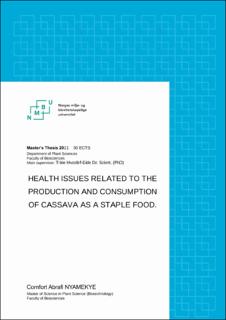| dc.description.abstract | Cassava plays a vital role in the world's tropical regions. However, it carries varying amounts of cyanogenic glucosides that are a possible human poison. Some forms of malpractices also endanger human health during production.
This research assessed the human health issues related to cassava production and consumption. It described a comprehensive study on cassava roots as a staple carbohydrate and the leaves as vegetables containing vitamin and mineral sources but deficient in amino acids and proteins. It explained that cassava is an essential crop to food security and serves many great purposes economic stability. This work reveals that, cassava contains cyanogenic glycosides (Hydrogen cyanide; HCN) and other anti-nutritional properties that threaten food safety and human health. Cyanogens, when ingested, could cause serious health problems for humans. Detecting and measuring cyanogen amounts in cassava can contribute to the prevention of cyanide poisoning due to the intake of improperly processed cyanogenic cassava.
A concise clarification has been given on the various diseases caused by cyanide intake or cyanide overdose, including konzo, ataxic neuropathy, goiter, and cyanide poisoning. It further described the different processing methods used to remove cyanide from cassava. These also include; boiling, fermentation, steaming, baking, frying, and drying methods. Plant breeders have been able to breed cultivars of cassava with low levels of hydrogen cyanide HCN) using the selection method. Efforts to develop more hydrogen HCN-low cassava varieties should be intensified by research institutes, especially in areas where cassava and its products have been recently introduced.
Moreover, improper farming practices, including improper use of agrochemicals, could lead to low farming populations' vulnerability, thus raising the alarm. The use of agrochemicals in cassava farming should be treated with caution to avoid posing dangers to cassava producers and consumers' health. Cassava-producing farmers should be informed on the need to keep their ecosystem and water supplies free from pathogens and organism-causing diseases. | en_US |

